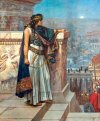IX.
‘Splash!’
“Careful, old man, being hard at your age is bad for your heart! A shower is exactly what you need, now! You are supposed to stay a bit longer alive! Orders of the emperor, remember!?”
Oh no! It is not true! There is no Queen Zenobia here! I must have been hallucinating! It’s again that nasty young legionnaire from Burdigalia, who is watering us to keep us alive! Soon he will be there with his sponge soaked in wine!
Apparently it works, since all the ‘old men’ are surprisingly still alive! I see Cassius Longinus straighten his back, while uttering a long roar of annoyance, frustration and pain. Is the great Cassius Longinus longing to death?
Soon, the legionnaire stands in front of my cross, with the sponge.
“Drink for you, old man!”
“My name.. is Loxuru!”
“That’s fine for you, old man!”
“I was born in Burdigalia, like you!”
“Nice! Here, drink!”
I lean forward to suck the sponge, obediently submitting to emperor Aurelian’s life extension program. After all, I am just a naked crucified criminal, right? So forget all that was. My dignity? Humiliated in public? I don’t care anymore (and maybe, more wine will make me more hallucinating about Zenobia).
This is why we stayed, when Aurelian approached. Was it loyalty to the queen? A sense of honour that a man does not flee and should accept his fate? Was it Cassius Longinus’ persuasive authority that kept us in Palmyra? Perhaps! But more likely, the greatest motivation to stay was the ‘great reward’, the desire, planted in our head, that the gorgeous Queen Zenobia would one day, or rather, one night, reward us for our advises with an intimate stay between her bedsheets! So we stayed, waiting for the reward that never came!
That young legionnaire, I think, if he fights bravely, keeps strong, obeys orders and submits to military discipline, he can make it to an optio, over, say twenty years! Suppose he will then be on guard duty on a crucifixion site at night, he can tell the young legionnaires under his command that, many years ago, he has witnessed the death on the cross of the once famous philosopher Cassius Longinus. That would be better than Aurelian’s idea to leave the philosopher to oblivion. He better would listen to his current optio, who puts the emphasis on the fact that Longinus’ fame did not make him immune for justice! Do not cancel him, but keep the memory of the downfall alive! The example, that’s what matters! Whether right or wrong, even a famous man can be put on trial and condemned to death and executed! That’s the lesson, the fate of Socrates teaches! Fame even does not protect against the ultimate public dishonour and humiliation on the cross! That’s what the fate of Cassius Longinus teaches!
“Want some more, old man!?”
THE END
Disclaimers and epilogue.
The previous story is based on historical events. Queen Zenobia, Emperor Aurelian and the philosopher Cassius Longinus are historical figures.
The following elements of the story diverge from history or are fictional :
-For the sake of the drama, Aurelian’s campaigns of reconquest have been switched. He first recaptured the Palmyrene Empire, and then the Gallic.
-Cassius Longinus and other advisers of Queen Zenobia have been executed on order of Aurelian, after the fall of Palmyra, but there is not the least evidence or indication that they got crucified.
-The trials and executions did not take place in Palmyra, but in Emesa (today’s Homs)
Much of our knowledge about the events is based on the ‘New History’, written by Zosimus, between 498 and 518 AD. Here are the excerpts:
[1.56.1] Meantime some of the Palmyrenes, that were shut up in the town, resolved to expose themselves courageously, and to hazard their being made captives in defense of their city. While others on the contrary employed humble and submissive gestures from the walls, and intreated pardon for what was past. The emperor accepting these tokens, and commanding them to fear nothing, they poured out of the town with presents and sacrifices in their hands.
[1.56.2] Aurelian paid due respect to the holy things, received their gifts, and sent them away without injury. But having made himself master of this city, with all the treasure it contained, he returned to Emesa, where he brought Zenobia and her accomplices to a judiciary trial. Zenobia coming into court pleaded strongly in excuse of herself, and produced many persons, who had seduced her as a simple woman, and among the rest Longinus, whose writings are highly beneficial to all lovers of learning.
[1.56.3] Being found guilty of the crimes laid to his charge, he received from the emperor sentence of death, which he bore with so much courage, as to console to his friends who were much concerned at his misfortunes. Several besides Longinus suffered upon the accusation of Zenobia.
According to some historians, Zenobia’s excuses that her advisers were to blame for the rebellion and the accusations towards them, to have her threatened with abuse, could have been a propaganda hoax set up by Aurelian to tarnish Zenobia’s reputation, and to present her as a coward, particularly to the population of Palmyra.
Zenobia’s later fate is uncertain. According to sources, she committed suicide (Zosimus) or was beheaded on order of Aurelian (Malalas). Most scholars assume that she was exposed in Aurelian’s victory parade in 274 AD and next given for marriage to a Roman nobleman or a senator, and she spent the rest of her life in a villa in Tibur, near Rome.
Two years after Zenobia’s defeat, Palmyra rebelled again. This time, Aurelian was less lenient. He had the city sacked and destroyed and many inhabitants were killed. Palmyra would never regain its greatness after this crushing.
Aurelian himself would meet a violent death, like nearly all Roman Emperors (one wonders how they still found candidates for the job). Reputed as stern on discipline and harsh on punishment during his military campaigns, he was killed in Thracia in 275 AD by a few of his men who faced court martial.
Much of the ruins of Palmyra have been preserved up to the Twentieth Century. The Syrian regime then politically recuperated Zenobia as an icon of ancient Syrian nationalism.
When in 2014, Islamic State took control of Palmyra, they savagely blew op some of the historical remains of the city.
The painting used as background for the manips, is “Queen Zenobia’s Last Look on Palmyra” (1888) by the British painter Herbert Schmalz (1856-1935).











